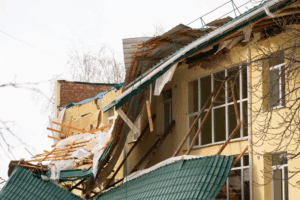How Gaithersburg’s weather damages roofs is something many homeowners don’t think about until they see a leak or missing shingles. The truth is, our city’s mix of heavy rain, humid summers, icy winters, and occasional hailstorms creates the perfect recipe for roof problems.
If you’ve noticed loose shingles, discoloration, or unexpected water stains on your ceiling, you’re not alone. Many Gaithersburg homeowners face the same frustrating reality: unpredictable weather slowly takes a toll on even the strongest roofs. The good news? You can protect your home once you understand the risks and how to respond.
What Gaithersburg Weather Looks Like

Before diving into roof damage, it helps to understand the kind of weather your roof faces year-round in Gaithersburg.
- Average Annual Rainfall: About 43 inches, higher than the national average
- Snowfall: Approximately 20 inches per year
- Summer Humidity Levels: Frequently over 70%, increasing moisture exposure
- Winter Lows: Temps often drop below 20°F, ideal for ice dam formation
- Wind Gusts: Storms can bring wind speeds up to 40–50 mph
- Severe Weather Alerts: Hail and strong thunderstorms are common from late spring through early fall
All of these factors slowly wear down roofing materials, especially when homeowners aren’t inspecting their roofs regularly.
The Biggest Weather Threats to Gaithersburg Roofs
Gaithersburg sees a variety of weather throughout the year, and each season brings its kind of damage.
Heavy rain and storms
These can loosen shingles, expose underlayment, and lead to leaks.
Snow and ice dams
In winter, melting snow can refreeze at the edges of your roof, pushing water underneath shingles and into your attic.
Wind gusts
Even moderate winds can lift shingles, especially if your roof is aging or wasn’t properly installed.
High humidity
Summer’s moisture encourages mold and mildew growth in roof layers and attic spaces.
How Gaithersburg Weather Damages Roofs Over Time
Here’s the problem: how Gaithersburg’s weather damages roofs doesn’t always happen in one big storm. In most cases, it’s a slow and steady breakdown.
Spring showers saturate shingles and seep into weak spots. Summer heat expands roof materials and dries out sealants. Fall leaves clog gutters, backing up water. Winter ice freezes everything in place and worsens small cracks. All these tiny problems build up and can eventually cost you thousands in repairs if left unchecked.
Signs Your Roof May Be Weather-Damaged
Not sure if your roof is holding up? Here are some subtle signs to watch for:
- Water spots on ceilings or walls
- Granules from shingles are collecting in your gutters
- Curling or cracked shingles
- Moss or algae growth on roof surfaces
- Drafts or temperature swings in upstairs rooms
These warning signs may seem small, but they often point to deeper issues caused by Gaithersburg’s weather conditions.
Weather-Ready Roof Protection: What You Can Do
To keep your roof in shape through all four seasons, it’s best to take both preventive and long-term upgrade steps.
Preventive Maintenance You Can Do
These small tasks go a long way in reducing the risk of weather damage:
- Clean your gutters every season to prevent water backup and ice dams
- Inspect your attic for signs of moisture, mold, or poor ventilation
- Trim tree branches hanging over your roof to reduce debris and damage during storms
- Check for missing or cracked shingles after every major storm
- Schedule annual inspections, especially before winter and after spring storms
Roof Upgrades That Stand Up to Gaithersburg Weather
If your roof is aging or repeatedly needing repairs, it may be time for some smart upgrades:
- Install ridge vents or attic fans to reduce summer heat and winter condensation, as proper attic ventilation plays a key role in protecting your roof year-round.
- Use architectural asphalt shingles, which are more durable and wind-resistant
- Apply roof coatings or sealants to help waterproof and extend roof life
- Consider metal roofing for superior protection against snow, rain, and wind
- Upgrade underlayment to waterproof or synthetic layers that resist moisture
Making even one of these upgrades can significantly improve your roof’s ability to handle Gaithersburg’s unpredictable weather.
Best Roofing Materials for Gaithersburg’s Climate
Not all roofing materials perform equally in Gaithersburg’s humid summers, cold winters, and seasonal storms. Here’s a breakdown of the most common options:
Asphalt Shingles
- Lifespan: 15–30 years
- Weather Resistance: Moderate
- Notes: Affordable and widely used, but may wear faster under extreme weather conditions
Architectural Shingles (Laminated Asphalt)
- Lifespan: 25–40 years
- Weather Resistance: High
- Notes: Thicker than standard shingles; better performance in wind and hail
Metal Roofing
- Lifespan: 40–70 years
- Weather Resistance: Excellent
- Notes: Ideal for snow, rain, and high winds; also reflects heat during summer
Clay or Concrete Tile
- Lifespan: 50+ years
- Weather Resistance: High
- Notes: Extremely durable, but a heavy roof structure may need reinforcement
Slate Roofing
- Lifespan: 75–100 years
- Weather Resistance: Excellent
- Notes: Premium material with a high price tag; long-lasting but very heavy
Wood Shingles or Shakes
- Lifespan: 20–40 years
- Weather Resistance: Low to Moderate
- Notes: Visually appealing, but not ideal for humid climates due to mold and rot risk
When to Call a Roofing Professional
If you’re seeing visible damage or it’s been a while since your last inspection, it’s time to talk to a pro. A roofing expert familiar with Gaithersburg homes can spot trouble early and help you plan necessary repairs or replacements.
Conclusion
Gaithersburg’s changing weather, rain, snow, humidity, and wind can silently wear down your roof over time. Knowing how Gaithersburg’s weather damages roofs helps you spot early warning signs, take preventive steps, and make smart upgrades that protect your home.
While regular maintenance goes a long way, don’t hesitate to call a trusted roofing professional if you notice issues or haven’t had an inspection in a while. They can catch problems early and save you from bigger headaches down the road.


